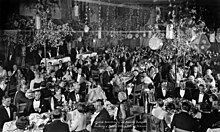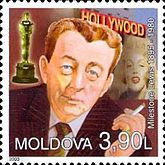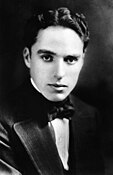1st Academy Awards
| 1st Academy Awards | |
|---|---|
 The first Academy Awards was a private dinner banquet in the Blossom Room of the Hollywood Roosevelt Hotel. | |
| Date | Thursday, May 16, 1929 |
| Site | Hollywood Roosevelt Hotel Hollywood, Los Angeles, California, USA |
| Hosted by | Douglas Fairbanks |
| Highlights | |
| Best Picture | N/A (Sunrise: A Song of Two Humans and Wings received predecessor awards) |
| Most awards | Seventh Heaven and Sunrise: A Song of Two Humans (3) |
| Most nominations | Seventh Heaven (5) |
The 1st Academy Awards ceremony, presented by the Academy of Motion Picture Arts and Sciences (AMPAS), honored the best films of 1927 and 1928 and took place on May 16, 1929, at a private dinner held at the Hollywood Roosevelt Hotel in Los Angeles, California. AMPAS president Douglas Fairbanks hosted the show. Tickets cost five dollars, 270 people attended the event and the ceremony lasted fifteen minutes. Awards were created by Louis B. Mayer, founder of Louis B. Mayer Pictures Corporation (at present merged into Metro-Goldwyn-Mayer). It is the only Academy Awards ceremony not to be broadcast either on radio or television.
During the ceremony, the AMPAS presented Academy Awards (now commonly referred to as Oscars) in twelve categories. Winners were announced three months before the live event. Some nominations were announced without reference to a specific film, such as for Ralph Hammeras and Nugent Slaughter, who received nominations in the now defunct category of Engineering Effects.[1] Unlike later ceremonies, an actor or director could be awarded for multiple works within a year. Emil Jannings, for example, was given the Best Actor award for his work in both The Way of All Flesh and The Last Command. Moreover, Charlie Chaplin and Warner Brothers each received an Honorary Award.[2][3]
Winners at the ceremony included Seventh Heaven and Sunrise: A Song of Two Humans, each receiving three awards, and Wings, receiving two awards. Among its honors, Sunrise won the award for "Unique and Artistic Production," and Wings won the award for "Outstanding Picture, Production." In every subsequent Academy Awards, these two awards categories were eliminated, replaced by a single award to honor the Best Picture of the year, usually seen as the Academy's top prize. In the first year, with no Best Picture award, Sunrise and Wings shared this highest honor, the former for artistic strength, the latter for production quality.[1]
Background
In 1927, the Academy of Motion Picture Arts and Sciences (AMPAS) was established by Louis B. Mayer, originator of Louis B. Mayer Pictures Corporation, which then would be joined into Metro-Goldwyn-Mayer (MGM), to unite the five branches of the film industry, including actors, directors, producers, technicians and writers.[4] Mayer commented on the creation of the awards "I found that the best way to handle [filmmakers] was to hang medals all over them ... If I got them cups and awards they'd kill them to produce what I wanted. That's why the Academy Award was created".[5] Mayer requested to Cedric Gibbons, art director of MGM, to design an Academy Award trophy.[4][6] Nominees were notified through a telegram in February 1928.[4] In August 1928, Mayer contacted the Academy Central Board of Judges to decide winners.[4] However, according to the American director King Vidor, the voting for the Academy Award for Best Picture was in the hands of the AMPAS founders Douglas Fairbanks, Sid Grauman, Mayer, Mary Pickford and Joseph Schenck.[7]
Ceremony
The ceremony was held on May 16, 1929,[2][3][8][9] at the Hollywood Roosevelt Hotel, located in Los Angeles, California.[2] It consisted of a private dinner with thirty-six banquet tables,[10] where 270 people attended and tickets cost five dollars.[2] Actors and actresses arrived to the hotel in luxury vehicles, where many fans attended to encourage celebrities.[10] It was not broadcast on radio or television.[2] It was hosted by AMPAS director Fairbanks,[2][3][9][11] during a fifteen minute-long event.[8]
Nominees and winners
Winners were announced three months before the ceremony.[2][3][8] The recipients included Emil Jannings, the first person to receive an Academy Award,[2] for Best Actor for the films The Way of All Flesh and The Last Command;[3][8] Janet Gaynor for Best Actress, for Seventh Heaven, Street Angel and Sunrise: A Song of Two Humans; Frank Borzage for Best Director, Drama for Seventh Heaven and Lewis Milestone for Best Director, Comedy for Two Arabian Knights; and the film Wings, the most expensive film of its time,[9] became the Best Picture recipient.[1] Charlie Chaplin and Warner Brothers each received an Honorary Award. Originally, Chaplin was a Best Actor, Best Writer and Best Director, Comedy nominee for the film The Circus, but was removed from the list, and was honored with the award;[3] while the company received the award for pioneering talking pictures. Awards also would favor big films' producers—Fox Films Corporation, MGM, Paramount Pictures, Radio-Keith-Orpheum and Warner Brothers Production.[4] Three categories (for Best Engineering Effects, Best Title Writing and Best Unique and Artistic Quality of Production) disappeared after the ceremony.[1]
Winners are listed first.
| Outstanding Picture, Production | Unique and Artistic Production |
|---|---|
| Best Director, Comedy Picture | Best Director, Dramatic Picture |
| Best Actor in a Leading Role | Best Actress in a Leading Role |
| Best Writing, Original Story | Best Writing, Adapted Story |
| Best Cinematography | Best Art Direction |
|
|
| Best Engineering Effects | Best Writing, Title Writing |
|
|
Honorary Award
- Charlie Chaplin
- "For versatility and genius in acting, writing, directing and producing The Circus".[2]
- Warner Brothers Production
- "For producing The Jazz Singer, the pioneer outstanding talking picture, which has revolutionized the industry".[2]
Multiple nominations and winners
|
The following films received multiple nominations.
|
The following films received multiple awards.
|
-
Wings is considered by media the first movie to win the Academy Award for Best Picture.[9]
-
Lewis Milestone, Best Director, Comedy Picture
-
Emil Jannings, Best Actor
-
Janet Gaynor, Best Actress
-
Charles Chaplin, Honorary Award
-
Warner Brothers Production, Honorary Award
See also
- Academy Awards
- List of Academy Awards ceremonies
- Academy Honorary Award
- 1927 in film
- 1928 in film
- Governors Awards
References
- ^ a b c d "The Official Academy Awards Database". Academy of Motion Picture Arts and Sciences. Retrieved February 18, 2012. Reader must select "1927/28" in the "Award Year(s):" drop-down menu and press "Search".
- ^ a b c d e f g h i j "History of the Academy Awards". Academy of Motion Picture Arts and Sciences. Archived from the original on April 8, 2010. Retrieved May 6, 2010.
{{cite web}}: Unknown parameter|deadurl=ignored (|url-status=suggested) (help) - ^ a b c d e f Dirks, Tim. "1927–28 Academy Awards Winners and History". Rainbow Media. Retrieved May 6, 2010.
- ^ a b c d e Cosgrave 2007, p. 1
- ^ Eyman 2005, p. 117
- ^ Eyman 2005, p. 209
- ^ Eyman 2005, p. 138
- ^ a b c d Pawlak, Debra Ann, The Story of the First Academy Awards, The MediaDrome.
- ^ a b c d "This day in History". History. A&E Television Networks. Retrieved October 5, 2010.
- ^ a b Cosgrave 2007, p. 4
- ^ "Names make news". Time Magazine. Time Inc. May 27, 1929. Archived from the original on October 27, 2010. Retrieved October 5, 2010.
{{cite web}}: Unknown parameter|deadurl=ignored (|url-status=suggested) (help)
Bibliography
- Eyman, Scott (2005), Lion of Hollywood: the life and legend of Louis B. Mayer (I ed.), New York, United States: Simon & Schuster, ISBN 0-7432-0481-6, OCLC 57506846
- Cosgrave, Bronwyn (2007), Made for Each Other: Fashion and the Academy Awards (I ed.), New York, United States: Bloomsbury Publishing USA, ISBN 978-0-7475-7630-3, OCLC 74523691






